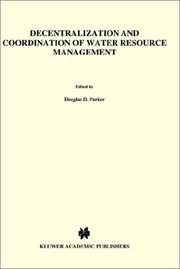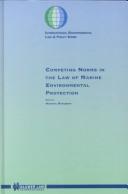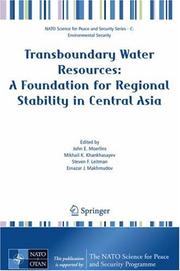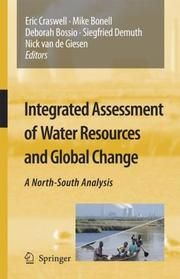| Listing 1 - 10 of 11 | << page >> |
Sort by
|

ISBN: 0792399145 Year: 1997 Publisher: Boston, MA Dordrecht London Kluwer Academic Press
Abstract | Keywords | Export | Availability | Bookmark
 Loading...
Loading...Choose an application
- Reference Manager
- EndNote
- RefWorks (Direct export to RefWorks)
Book
ISBN: 2110051930 9782110051936 Year: 2002 Volume: 12 Publisher: Paris: La Documentation française,
Abstract | Keywords | Export | Availability | Bookmark
 Loading...
Loading...Choose an application
- Reference Manager
- EndNote
- RefWorks (Direct export to RefWorks)
Fresh water --- Water resources development --- Water rights (International law) --- Water-supply --- Law and legislation. --- International cooperation. --- Law and legislation --- International cooperation --- 629.4.082.4 --- Supply of water --- 629.4.082.4 Supply of water --- International law --- Fresh water - Law and legislation. --- Water resources development - Law and legislation. --- Water-supply - International cooperation. --- Water resources development - Law and legislation --- Water-supply - International cooperation

ISBN: 904110657X 9789041106575 Year: 1997 Publisher: London: Kluwer law international,
Abstract | Keywords | Export | Availability | Bookmark
 Loading...
Loading...Choose an application
- Reference Manager
- EndNote
- RefWorks (Direct export to RefWorks)
Water --- Water-supply --- Eau --- Law and legislation --- Congresses --- Government policy --- International cooperation --- Droit --- Congrès --- Approvisionnement --- Politique gouvernementale --- Coopération internationale --- Law and legislation. --- Government policy. --- International cooperation. --- Congrès --- Coopération internationale --- Congresses. --- Water - Law and legislation --- Water-supply - Government policy --- Water-supply - International cooperation
Book
ISSN: 13784080 ISBN: 9782807306356 2807306357 Year: 2017 Volume: *16 Publisher: Louvain-la-Neuve: De Boeck supérieur,
Abstract | Keywords | Export | Availability | Bookmark
 Loading...
Loading...Choose an application
- Reference Manager
- EndNote
- RefWorks (Direct export to RefWorks)
La crise de l’eau affecte de nombreuses régions du monde. Cette réalité a un impact important sur les collectivités locales, les écosystèmes d’eau douce et, plus généralement, sur notre économie. L’auteur, Brian Richter, nous aide à comprendre que cette crise ne nous conduit pas forcément à la catastrophe. Dans un style simple et direct, il pose les bases de la gestion de l’eau et de son cycle, et confronte les enjeux globaux et leur compréhension par des acteurs locaux. À travers des exemples concrets et de nombreuses anecdotes, l’auteur nous propose six outils pour limiter les pénuries ainsi que des suggestions détaillées pour que communautés locales, organisations publiques et compagnies privées puissent les éviter sur le long terme grâce à un plan pragmatique de gestion durable. D’un niveau scientifique très abordable, l’ouvrage fait figure de guide pratique discutant des grandes idées tout en restant focalisé sur un enjeu central : une meilleure gestion des ressources en eau.
Water supply --- Water resources development --- Government policy --- International cooperation --- Water --- Political aspects --- Economic aspects --- Management --- Approvisionnement en eau. --- Gestion des ressources en eau. --- Ressources en eau. --- Water-supply --- Eau --- Ressources en eau --- Approvisionnement --- Exploitation --- Water supply - Government policy --- Water supply - International cooperation --- Water resources development - Government policy --- Water resources development - International cooperation
Book
ISBN: 222110188X 9782221101889 Year: 2004 Publisher: Paris: Laffont,
Abstract | Keywords | Export | Availability | Bookmark
 Loading...
Loading...Choose an application
- Reference Manager
- EndNote
- RefWorks (Direct export to RefWorks)
Water resources development --- Water-supply --- International cooperation. --- AA / International- internationaal --- 385.23 --- 351.2 --- 355 --- 338.74 --- 338.730 --- Andere vervoermiddelen over land: pijpleidingen; vervoer van olie, gas, elektriciteit, water. --- Openbare gezondheid. Milieubescherming. Milieuvervuiling. --- Milieu --- Watervoorziening. --- Extractieve nijverheid: algemeenheden. --- Water supply --- Availability, Water --- Water availability --- Water resources --- Natural resources --- Public utilities --- Water utilities --- Energy development --- International cooperation --- Extractieve nijverheid: algemeenheden --- Watervoorziening --- Openbare gezondheid. Milieubescherming. Milieuvervuiling --- Andere vervoermiddelen over land: pijpleidingen; vervoer van olie, gas, elektriciteit, water --- Water-supply - International cooperation.

ISBN: 9781402067341 1402067348 1402067356 9786611339401 1281339407 1402067364 Year: 2008 Publisher: Dordrecht, Netherlands : Springer,
Abstract | Keywords | Export | Availability | Bookmark
 Loading...
Loading...Choose an application
- Reference Manager
- EndNote
- RefWorks (Direct export to RefWorks)
“Human history becomes more and more a race between education and catastrophe.” H. G. Wells Despite a growing awareness of the importance of freshwater, human actions continue to degrade the freshwater ecosystems upon which we depend. Most regions of the world face serious impending problems related to the availability and efficient/equitable distribution of freshwater – these problems become exacerbated when both surface water and groundwater flows between and among multiple countries. As populations grow and the overall demand for water increases, the various and often competing demands for the finite stock of freshwater will increase. These shortages can lead to ecological/resource inefficiencies, economic/industrial problems, degradation of human health, social instability, and even conflict. The Central Asian republics and neighboring countries are currently experiencing these problems - problems that will become exacerbated by global climate change, increasing population and growing demands for water. In response to these growing concerns, on 20-22 June 2006, a NATO-sponsored Advanced Research Workshop (ARW) was organized in Almaty, Kazakhstan entitled, “Facilitating Regional Security in Central Asia through Improved Management of Transboundary Water Basin Resources”. This scientific meeting convened leading environmental experts from Central Asia, the Caucasus and from NATO member countries to address the myriad of issues involving shared freshwater among the countries in this region. Issues involving ecology, law, economics, politics, water policy and integrated water management were discussed and evaluated. Against the backdrop of the widely known Aral Sea problem, these leading experts addressed a wide variety of current and emerging issues related to transboundary water management.
Water-supply --- Eau --- Congresses. --- International cooperation --- Approvisionnement --- Coopération internationale --- Congrès --- Water-supply -- Asia, Central -- Congresses. --- Water-supply -- Asia, Central. --- Water-supply -- International cooperation -- Congresses. --- Water-supply -- International cooperation. --- Physical Geography --- Environmental Engineering --- Geography --- Civil & Environmental Engineering --- Earth & Environmental Sciences --- Engineering & Applied Sciences --- Availability, Water --- Water availability --- Water resources --- Environment. --- Environmental management. --- Hydrogeology. --- Economic geography. --- Water pollution. --- Environmental Management. --- Waste Water Technology / Water Pollution Control / Water Management / Aquatic Pollution. --- Water Policy/Water Governance/Water Management. --- Economic Geography. --- Natural resources --- Public utilities --- Water resources development --- Water utilities --- Environmental pollution. --- Hydraulic engineering. --- Geography. --- Cosmography --- Earth sciences --- World history --- Engineering, Hydraulic --- Engineering --- Fluid mechanics --- Hydraulics --- Shore protection --- Chemical pollution --- Chemicals --- Contamination of environment --- Environmental pollution --- Pollution --- Contamination (Technology) --- Asbestos abatement --- Bioremediation --- Environmental engineering --- Environmental quality --- Factory and trade waste --- Hazardous waste site remediation --- Hazardous wastes --- In situ remediation --- Lead abatement --- Pollutants --- Refuse and refuse disposal --- Environmental stewardship --- Stewardship, Environmental --- Environmental sciences --- Management --- Environmental aspects --- Geography, Economic --- World economics --- Commercial geography --- Geohydrology --- Geology --- Hydrology --- Groundwater --- Aquatic pollution --- Fresh water --- Fresh water pollution --- Freshwater pollution --- Inland water pollution --- Lake pollution --- Lakes --- Reservoirs --- River pollution --- Rivers --- Stream pollution --- Water contamination --- Water pollutants --- Water pollution --- Waste disposal in rivers, lakes, etc. --- Pollution.
Book
ISBN: 9400704755 9401782741 9786613453129 9400704763 1283453126 Year: 2012 Publisher: Dordrecht ; New York : Springer Science+Business Media B.V.,
Abstract | Keywords | Export | Availability | Bookmark
 Loading...
Loading...Choose an application
- Reference Manager
- EndNote
- RefWorks (Direct export to RefWorks)
Water - and its governance - is becoming a global concern partly because it is turning into a goods in short supply, with devastating effects on literally billions of people, but also because it is the "carrier" of global warming; whether through irregular weather patterns or through flooding, water is how global warming will be 'felt'. The lion's share of the globally available fresh water resources is to be found in transboundary systems. In spite of its significance, the generated knowledge on how to deal with transboundary waters is weak and leaves policy makers with seemingly unavoidable, trade-off dilemmas and prioritizations, often with detrimental effects. In order to disentangle this predicament this volume works with one case: the Lower Mekong Basin and covers state-of-the-art academic and practitioners' knowledge and hence appeals to a wide audience. The topic this volume addresses is situated in the nexus of an IR- (International Relations) approach focussing on transboundary politics and its inclination to remain within the sphere of state sovereignty and national interest on the one hand, and Development studies, with its imperatives on participation, planning, and intervention, on the other. The dilemma, we argue, of better understanding transboundary water management lies in how to understand how these two rationalities can be simultaneously nurtured. Audience: This book will be relevant to scholars, as it provides cutting-edge research, and students, since it covers the primary debates in the field, interested in resource management, regional politics, and development issues in the area. It also addresses the global debate on transboundary water management and presents an in-depth case of one of the globally most sophisticated attempts at pursuing sustainable river basin management. Finally, practitioners and policymakers would benefit greatly because all contributions have explicit policy relevance, launching suggestion on improvements in water management.
Mekong River Watershed. --- Watershed management -- Mekong River Watershed. --- Water-supply -- International cooperation. --- Watershed management --- Water-supply --- Earth & Environmental Sciences --- Mechanical Engineering --- Engineering & Applied Sciences --- Hydraulic Engineering --- Environmental Sciences --- International cooperation --- International cooperation. --- Watershed development --- Watersheds --- Management --- Mekong River Basin --- Environment. --- Environmental management. --- Political science. --- Behavioral sciences. --- Ecology. --- Waste management. --- Sustainable development. --- Sustainable Development. --- Water Policy/Water Governance/Water Management. --- Waste Management/Waste Technology. --- Political Science. --- Behavioral Sciences. --- Ecosystem management --- Waste disposal. --- Animal behavior. --- Animals --- Animals, Habits and behavior of --- Behavior, Animal --- Ethology --- Animal psychology --- Zoology --- Ethologists --- Psychology, Comparative --- Administration --- Civil government --- Commonwealth, The --- Government --- Political theory --- Political thought --- Politics --- Science, Political --- Social sciences --- State, The --- Development, Sustainable --- Ecologically sustainable development --- Economic development, Sustainable --- Economic sustainability --- ESD (Ecologically sustainable development) --- Smart growth --- Sustainable development --- Sustainable economic development --- Economic development --- Balance of nature --- Biology --- Bionomics --- Ecological processes --- Ecological science --- Ecological sciences --- Environment --- Environmental biology --- Oecology --- Environmental sciences --- Population biology --- Behavior --- Environmental aspects --- Ecology --- Ecology . --- Environmental stewardship --- Stewardship, Environmental

ISBN: 1280816465 9786610816460 1402055919 1402055900 9400793111 9781402055904 Year: 2007 Publisher: Dordrecht: Springer,
Abstract | Keywords | Export | Availability | Bookmark
 Loading...
Loading...Choose an application
- Reference Manager
- EndNote
- RefWorks (Direct export to RefWorks)
How can the Earth’s finite water resources be managed sustainably to meet the growing needs of humans and of nature in ways that avert the looming crisis? The need to find answers to this question has exercised the minds of many scientists, practitioners and policymakers who recognise the urgency of the problems. These concerns have spawned a number of international research initiatives and programs, prominent representatives of which met to review progress and exchange views at an international conference in Bonn, Germany in February 2005. The pressing water problems must clearly be tackled from an integrated perspective taking into account environmental, human and technological factors and especially their interdependence. The key papers in this volume from the Bonn conference focus on the challenges of integrated assessment of water resources in the context of global change. The growing gap between North and South is also addressed, in terms not only of access to water and its quality, but also of the capacity to do research and implement solutions. The coverage of the papers is up-to-date and comprehensive. Highlights include emerging concepts such as blue and green water, virtual water, the water footprints of nations, multi-agent modelling, linkages between water and biodiversity, and social learning and adaptive management. Audience: Policy-makers, practitioners and researchers concerned with integrated water resources management; scientists from physical, biological, ecological, and social sciences involved in research on global environmental change and natural resources; scientists concerned with water resources in developing countries.
Water-supply --- Integrated water development --- Water resources development --- Management --- International cooperation --- Environmental aspects --- Energy development --- Natural resources --- Integrated development of water resources --- Water development, Integrated --- Water conservation --- Water use --- Availability, Water --- Water availability --- Water resources --- Public utilities --- Water utilities --- Environmental pollution. --- Climatic changes. --- Landscape ecology. --- Hydraulic engineering. --- Environmental economics. --- Waste Water Technology / Water Pollution Control / Water Management / Aquatic Pollution. --- Hydrology/Water Resources. --- Climate Change. --- Landscape Ecology. --- Hydrogeology. --- Environmental Economics. --- Economics --- Environmental quality --- Engineering, Hydraulic --- Engineering --- Fluid mechanics --- Hydraulics --- Shore protection --- Ecology --- Changes, Climatic --- Changes in climate --- Climate change --- Climate change science --- Climate changes --- Climate variations --- Climatic change --- Climatic changes --- Climatic fluctuations --- Climatic variations --- Global climate changes --- Global climatic changes --- Climatology --- Climate change mitigation --- Teleconnections (Climatology) --- Chemical pollution --- Chemicals --- Contamination of environment --- Environmental pollution --- Pollution --- Contamination (Technology) --- Asbestos abatement --- Bioremediation --- Environmental engineering --- Factory and trade waste --- Hazardous waste site remediation --- Hazardous wastes --- In situ remediation --- Lead abatement --- Pollutants --- Refuse and refuse disposal --- Economic aspects --- Water pollution. --- Hydrology. --- Climate change. --- Aquatic pollution --- Fresh water --- Fresh water pollution --- Freshwater pollution --- Inland water pollution --- Lake pollution --- Lakes --- Reservoirs --- River pollution --- Rivers --- Stream pollution --- Water contamination --- Water pollutants --- Water pollution --- Waste disposal in rivers, lakes, etc. --- Geohydrology --- Geology --- Hydrology --- Groundwater --- Aquatic sciences --- Earth sciences --- Hydrography --- Water --- Global environmental change --- Water-supply - Management - Congresses --- Water-supply - International cooperation - Congresses --- Integrated water development - Congresses --- Water resources development - Environmental aspects - Congresses
Book
ISBN: 9048123437 9786612332487 1282332481 9048123445 9048123364 9781282332485 9789048123445 Year: 2009 Publisher: Dordrecht, Netherlands : Springer,
Abstract | Keywords | Export | Availability | Bookmark
 Loading...
Loading...Choose an application
- Reference Manager
- EndNote
- RefWorks (Direct export to RefWorks)
The UN designated the decade 2005–2015 as the International Decade for Action – Water for Life. The move was initiated at the third World Water Forum in Kyoto, 2003, and it could prove the most significant and effective outcome of the triennial series of World Water For a yet. Its major aims are: (1) to promote efforts to fulfil recent international commitments, especially in the Millennium Goals, (2) to advance towards a truly integrated, int- national approach to sustainable water management, and (3) to put special emphasis on the role of women in these efforts. Even so, it faces tremendous and, as I write, increasing obstacles. The intense season of hurricanes and tropical storms in 2008 illustrated yet again not only the power of nature, but also the vulnerability of the poorer nations, like Haiti and Jamaica. New Orleans and Texas fared better, not because of the efforts of the International Decade for Natural Disasters (1990–2000) to increase preparedness, but more because the USA had learnt from its own experiences in Hurricane Katrina. The biggest obstacle of all is the burgeoning world population. It took off last century, but it is predicted to reach unimaginable heights this century: at least 10 billion by 2050, maybe 20 billion by 2100. Governments are powerless to halt it, even the Chinese. Achieving water security globally against this backdrop will be a Herculean task.
Water-supply -- International cooperation. --- Water-supply -- Risk assessment. --- Water-supply. --- Environmental policy --- Water-supply --- International cooperation. --- Security measures. --- Availability, Water --- Water availability --- Water resources --- Environment. --- Environmental management. --- Quality control. --- Reliability. --- Industrial safety. --- Water pollution. --- Waste Water Technology / Water Pollution Control / Water Management / Aquatic Pollution. --- Water Policy/Water Governance/Water Management. --- Quality Control, Reliability, Safety and Risk. --- Natural resources --- Public utilities --- Water resources development --- Water utilities --- Environmental pollution. --- System safety. --- Safety, System --- Safety of systems --- Systems safety --- Accidents --- Industrial safety --- Systems engineering --- Chemical pollution --- Chemicals --- Contamination of environment --- Environmental pollution --- Pollution --- Contamination (Technology) --- Asbestos abatement --- Bioremediation --- Environmental engineering --- Environmental quality --- Factory and trade waste --- Hazardous waste site remediation --- Hazardous wastes --- In situ remediation --- Lead abatement --- Pollutants --- Refuse and refuse disposal --- Prevention --- Environmental aspects --- Industrial accidents --- Industries --- Job safety --- Occupational hazards, Prevention of --- Occupational health and safety --- Occupational safety and health --- Prevention of industrial accidents --- Prevention of occupational hazards --- Safety, Industrial --- Safety engineering --- Safety measures --- Safety of workers --- System safety --- Dependability --- Trustworthiness --- Conduct of life --- Factory management --- Industrial engineering --- Reliability (Engineering) --- Sampling (Statistics) --- Standardization --- Quality assurance --- Quality of products --- Environmental stewardship --- Stewardship, Environmental --- Environmental sciences --- Management --- Aquatic pollution --- Fresh water --- Fresh water pollution --- Freshwater pollution --- Inland water pollution --- Lake pollution --- Lakes --- Reservoirs --- River pollution --- Rivers --- Stream pollution --- Water contamination --- Water pollutants --- Water pollution --- Waste disposal in rivers, lakes, etc. --- Risk assessment. --- NATO. --- Jerewan <2007>
Book
ISBN: 3642237428 9786613450999 1283450992 3642237436 Year: 2012 Publisher: New York : Springer,
Abstract | Keywords | Export | Availability | Bookmark
 Loading...
Loading...Choose an application
- Reference Manager
- EndNote
- RefWorks (Direct export to RefWorks)
This study presents a unique way to utilize the existing literature to explain the success of treaties in managing hydrologic stress. Literature-derived core concepts are summarized as seven treaty mechanisms categories (specificity, uncertainty management, enforcement, communications, flexibility, integrativeness, and scale) and are hypothesized as important for shaping the institutional resiliency of a treaty. Treaty design is shown to have a relevant and important role in shaping basin management so that nations may better achieve their goals in a changing climate.
Water-supply -- International cooperation. --- Water-supply. --- Water-power --- Climatic changes --- Water rights (International law) --- Water-supply --- Geography --- Mechanical Engineering --- Engineering & Applied Sciences --- Earth & Environmental Sciences --- Physical Geography --- Hydraulic Engineering --- International cooperation --- Water rights. --- Water resources development --- Law and legislation. --- Rights, Water --- Water rights --- Law and legislation --- Earth sciences. --- Environmental management. --- Climate change. --- Hydrogeology. --- Atmospheric sciences. --- Water pollution. --- Earth Sciences. --- Water Policy/Water Governance/Water Management. --- Climate Change/Climate Change Impacts. --- Atmospheric Sciences. --- Waste Water Technology / Water Pollution Control / Water Management / Aquatic Pollution. --- Environmental Management. --- Water --- Riparian rights --- Water trusts --- Hydraulic engineering. --- Environmental pollution. --- Environmental stewardship --- Stewardship, Environmental --- Environmental sciences --- Management --- Chemical pollution --- Chemicals --- Contamination of environment --- Environmental pollution --- Pollution --- Contamination (Technology) --- Asbestos abatement --- Bioremediation --- Environmental engineering --- Environmental quality --- Factory and trade waste --- Hazardous waste site remediation --- Hazardous wastes --- In situ remediation --- Lead abatement --- Pollutants --- Refuse and refuse disposal --- Engineering, Hydraulic --- Engineering --- Fluid mechanics --- Hydraulics --- Shore protection --- Environmental aspects --- Aquatic pollution --- Fresh water --- Fresh water pollution --- Freshwater pollution --- Inland water pollution --- Lake pollution --- Lakes --- Reservoirs --- River pollution --- Rivers --- Stream pollution --- Water contamination --- Water pollutants --- Water pollution --- Waste disposal in rivers, lakes, etc. --- Atmospheric sciences --- Earth sciences --- Atmosphere --- Changes, Climatic --- Changes in climate --- Climate change --- Climate change science --- Climate changes --- Climate variations --- Climatic change --- Climatic fluctuations --- Climatic variations --- Global climate changes --- Global climatic changes --- Climatology --- Climate change mitigation --- Teleconnections (Climatology) --- Geohydrology --- Geology --- Hydrology --- Groundwater --- Water resources --- Treaties and conventions --- International relations --- Climate change adaptation and mitigation --- Reviews of research --- Models --- Case studies --- Statistics --- Overseas item --- Global environmental change
| Listing 1 - 10 of 11 | << page >> |
Sort by
|

 Search
Search Feedback
Feedback About UniCat
About UniCat  Help
Help News
News